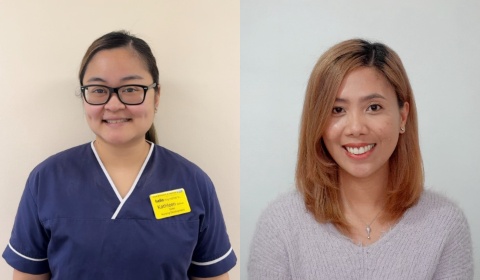The preceptorship programme provides support, guidance, and development for newly qualified nurses, internationally trained nurses, operating department practitioners and nursing associates at our hospitals. The programme helps to build confidence and competence when individuals transition from being a student to a professional. The programme also promotes a positive working experience, helping preceptees feel valued and well-integrated into the organisation.
We hear from Kathleen Bolivar and Grace Armonio Nieves, members of the nursing development and education team, who lead the preceptorship programme at our hospitals. They talk about their nursing journey so far, their roles day-to-day, and what makes them proud to be a nurse.

What is your career history?
Kathleen: I graduated in 2008 and worked in the Philippines as a nurse in neuro-intensive care and cardiac intensive care units, before I came to the UK in 2013. I worked in a neurorehabilitation organisation based in Surrey before coming to Royal Brompton Hospital in 2015 to work as a nurse in the adult intensive care unit (AICU).
Alongside learning and developing my skills to apply in my everyday practice, I was also always passionate about supporting students and new nurses on our unit to deliver safe and high-quality nursing care. This led me to apply to become a practice facilitator in AICU, which involved supporting and coordinating the development of new members of staff on the unit, before eventually becoming a preceptorship lead in 2020.
Grace: I worked as a nurse in the Philippines in a medical and surgical ward and in intensive care before coming to the UK in 2017. Upon arriving, I worked in the intensive care unit at Royal Brompton Hospital, where I took my Objective Structured Clinical Examination (OSCE) exam and qualified as a UK nurse in that same year. After qualifying, I worked as a staff nurse and was then promoted to senior staff nurse in 2020.
In June 2021, I joined the nursing development and education team in my current role as preceptorship lead. From 2023, I also became the corporate nursing team digital lead and supported in the launch of the Trust’s new electronic health record system in my brief time as Apollo Nursing Information Officer.
What do you do day-to-day?
Kathleen: As preceptorship leads, we are responsible for the delivery and evaluation of the hospitals’ preceptorship programme. In addition to providing structured learning sessions, we also provide pastoral support by frequently visiting clinical areas to see the preceptees in person, making sure that they are well-supported and all their questions and concerns are addressed. We encourage open conversations and signpost them to wellbeing initiatives at our hospitals and the wider Trust.
We also meet with other preceptors, practice educators and managers to discuss any further learning or holistic support that the preceptees need. Alongside this, we support the education and training of the nursing workforce as whole, and work with members of the multidisciplinary team to develop and implement specific clinical policies.
Maintaining strong partnerships and communication with fellow preceptorship leads from other Trusts and the national preceptorship team is vital. Part of our job is to keep up to date with the latest information and best practice in supporting our newly qualified practitioners.
Grace: In my role, each day is different. I ensure that all preceptees at our hospitals are enrolled onto the preceptorship programme by working with the nursing recruitment team and clinical leaders. I allocate these new preceptees into cohorts, where they are then scheduled for study days to attend as part of the programme. I also organise and teach on those study days.
Additionally, I ensure that the more senior members of staff paired up with the new preceptees are trained for their role through facilitating workshops which are specific to them.
Alongside other members of the multidisciplinary team, I am responsible for developing specific clinical policies, ensuring that the most recent evidence-based practice is being used, and I provide training to the clinical areas related to the policy when requested. I also facilitate the delivery of the Band 5 & 6 Development Programme, one of the nursing development programmes we offer to enhance the knowledge, leadership and communication skills of nurses at our hospitals. Lastly, as the corporate nursing team digital lead, I manage the nursing development and education pages on the hospitals’ intranet and ensure that all information is up to date.
Why did you get into nursing?
Kathleen: As a child, I always wanted to have a job where I could interact with people and make a difference in their lives, however small. As a nurse, I get to touch the lives of people in my everyday practice. The feeling after every shift knowing that I have made a difference to my patients and their families gives me a sense of fulfilment and purpose – it truly makes me appreciate life more.
As preceptorship lead, seeing the remarkable development of the preceptees – from their sense of confidence to how they have progressed in their respective fields – makes me feel proud of them, and I’m pleased that I get to witness their growth and successes.
Grace: To be honest, nursing was not my first choice because I wanted to be a journalist. However, I have a lot of family members who are nurses who have influenced me to take on the same role.
During the pandemic, I loved and enjoyed being a nurse more than ever. I felt and understood that the profession is indispensable, and a nurse’s role in assisting people towards recovery is incredibly special. I’m very proud to be a nurse and make a meaningful difference in people’s lives. As a nurse educator, I’m happy that I’m helping shape new nurses to achieve the same satisfaction and fulfilment as I have.
For more information on our nursing vacancies, visit our vacancies webpage.
